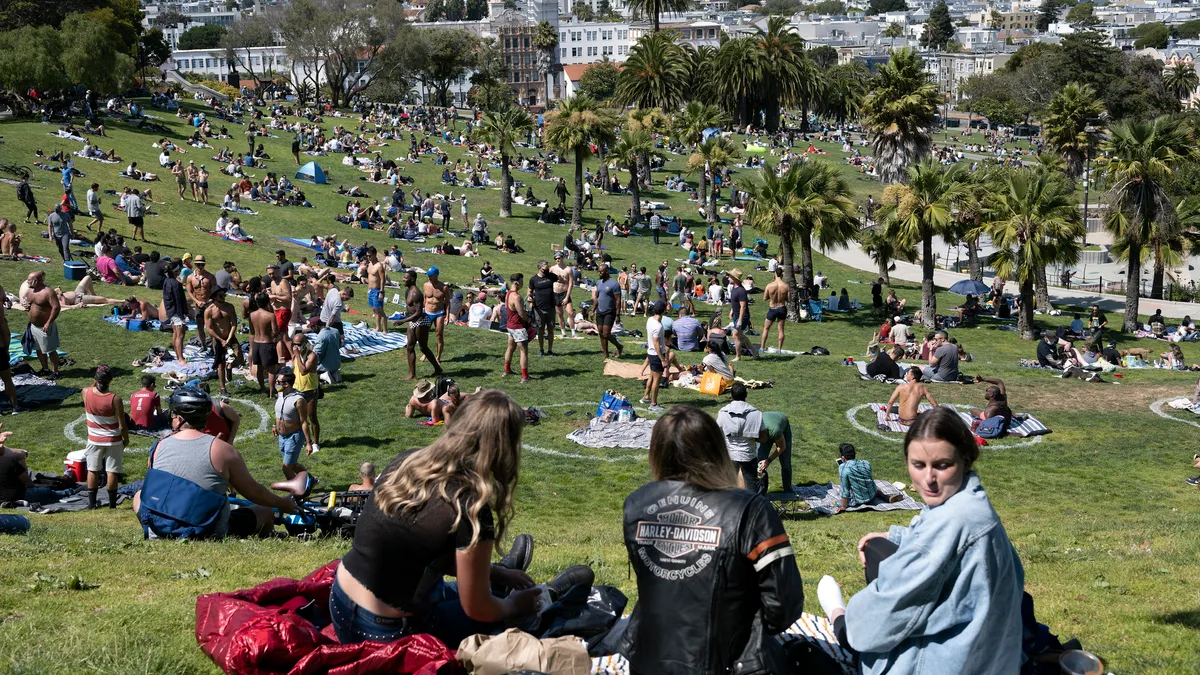Dive Brief:
- Mayors expect their residents to spend more time outdoors after being inspired to do so amid the coronavirus pandemic, but few leaders are looking to incorporate pandemic-fueled changes to those spaces into long-term plans, according to a survey report of 130 mayors from 38 states released Wednesday.
- Three out of four respondents to the Menino Survey of Mayors from Boston University said they expect residents to spend more time outside at open spaces compared to before the pandemic, and around two-thirds said they think residents will spend more time biking and walking.
- Despite that trend, just over a third of mayors said they do not expect to see changes made to outdoor spaces during the pandemic — like expanded outdoor dining and infrastructure — last long-term due to budgetary constraints. But planning parks and open space with an equity lens is expected to endure, with 52% saying they believe the quality of parks vary across neighborhoods.
Dive Insight:
Parks and open space took on increased value last year as residents sought fresh air while social distancing and stay-at-home orders were in place to stop the spread of the coronavirus. And cities responded by closing certain streets to vehicle traffic, including in parks, to help cyclists and pedestrians move about safely and to encourage more outdoor dining at restaurants.
But desire to make those changes permanent appears to be low: just over a third of respondents say they plan to keep the new space allocated for outdoor dining, while only 6% said they plan to make changes like widened sidewalks, new bike lanes and closed roads a permanent feature of their cities.
"It was interesting to realize that there was this economic motivation to keep restaurants going and do it in the safest way possible for patrons and staff," Katharine Lusk, co-director of Boston University's Initiative on Cities and a report co-author, said. "We thought based on prior surveys that mayors would similarly have been motivated to accelerate bike infrastructure expansion. And we were really struck by the fact that there wasn't as much motivation and acceleration toward the expansion of bike infrastructure and the reclamation of parking spaces and driving lanes toward new bike lanes."
But respondents understand the important role parks and open spaces play, the survey says, and also understand the need to invest more equitably in those spaces in the future. That trend had begun in some cities before the pandemic and last summer’s protests for racial justice, but Lusk said it has been accelerated now with more leaders looking to use municipal bonds to pay for improvements and adding equity into the masterplan process.
Others have said that designing parks and other public spaces could have a "ripple effect" on a city's resilience and community. A recent report by the nonprofit Knight Foundation and urban research and design consulting firm Gehl said community-driven planning can help advance those goals and aid a more equitable recovery from COVID-19.
But those planning efforts may be challenged by cities' fiscal constraints as they recover from the pandemic. The National League of Cities estimates that local governments face a $90 billion budget shortfall in FY 2021, and of those surveyed, 38% said they anticipate "dramatic cuts" to budgets for parks and recreation. Meanwhile, the long-term impacts of the pandemic on cities' downtowns remain to be seen, especially if the trend towards remote work continues, leading some mayors to be strikingly pessimistic about the future.
And while this survey was taken before the American Rescue Plan and its direct aid for state and local governments was passed, Lusk said some tough financial decisions still lie ahead, especially when it comes to choosing which areas of city life must face cuts. But only time will tell, she said.
"One thing we don't yet know is now more cities are seeing some of the pain of the pandemic and pandemic spending alleviated," she said. "Is that good news for their parks budget? Is it good news for their bike infrastructure budget? Those are the kinds of things that mayors are now going to have the resources to be able to invest in."












